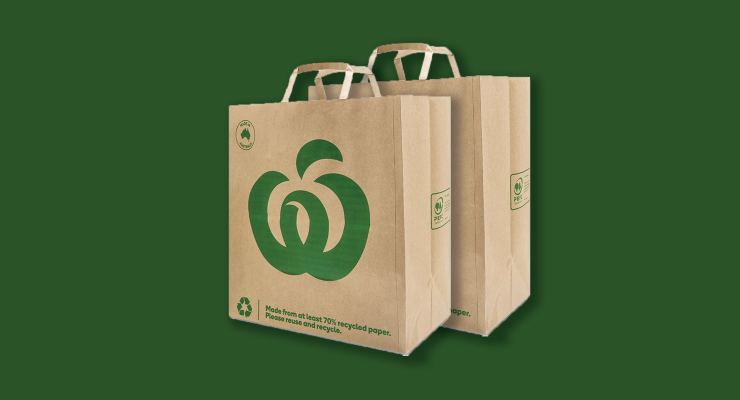
Woolworths has quietly abandoned a plan to make all of its paper bags in Australia and will continue outsourcing some of the production to China and Vietnam, Crikey can reveal.
The grocery giant set the goal of making all of its paper bags in Australia in 2021 in response to customer backlash.
The previous year, when the supermarket chain began offering paper bags at checkout, some customers expressed disappointment the bags were made overseas. The backlash was amplified in numerous news stories at the time and Woolworths then announced it had signed a deal with Australian manufacturer Detpak.
Parent company Woolworths Group bragged in a media release in April 2021: “The supermarket has been working with Detpak to plan and grow local capacity since early 2020 to produce the paper bags at scale in Australia and support a transition to a 100% Australian-made line nationally.”
But by the middle of 2022 it had become clear internally that Woolworths wasn’t going to be able to keep that promise, Crikey understands.
That’s when Woolworths and its discount department store sister chain Big W announced they would begin phasing out plastic shopping bags nationwide, in a move timed with World Environment Day and aimed at “[removing] 9000 tonnes of plastic” annually.
Scrapping the plastic bags meant there would be a huge increase in demand for paper bags, and the chain realised it wouldn’t be able to produce the required amount in Australia.
Unlike the multimillion-dollar deal with Detpak, which was announced in a media release and written up in news reports, the decision to abandon the goal of making all the bags in Australia was not communicated to the public at all.
Woolworths Group confirmed this week it would continue to make bags abroad, but refused to say what percentage was being made in Australia, saying that detail was “commercial in confidence”.
“The production capacity in Australia is currently limited and we’re working with two Australian manufacturers to source as many locally made paper bags as possible,” a spokesperson told Crikey.
The spokesperson said Woolworths had wanted to make the paper bags in Australia from the start, and that the desire to work with local manufacturers was not prompted by customer feedback.
The other Australian paper bag manufacturer that has gone into business with Woolworths is Opal, based in Victoria.
The partnership with Opal created 30 Australian jobs, Woolworths said, while the deal with South Australia-based Detpak created 24 jobs.
The paper for the Australian-made bags is being manufactured in the Maryvale mill in regional Victoria.
The phasing out of plastic bags had proceeded according to plan, Woolworths said, and 15-cent plastic bags have now been removed from “all stores nationwide”.
Competitors Aldi and Coles have also said they will stop offering soft plastic bags.
Lightweight plastic bags less than 36 microns thick have been banned in every Australian state and territory, according to the National Retail Association.
Are you disappointed by Woolies’ decision to outsource? Let us know your thoughts by writing to letters@crikey.com.au. Please include your full name to be considered for publication. We reserve the right to edit for length and clarity.








I really can’t see much effective communication or action on plastic reduction and recycling other than the narrow disposable plastic bag news.
We’ve known for years that the labelling on the plethora of plastic outputs of super markets and food venues is essentially not fit for purpose, as few people can distinguish the plastic recycling symbols, and fewer still can match them up with the options available in their local government area.
Initiatives to create substitutes for disposable packaging seem to come and go, or have “implement by” dates that exceed the use by date for granite.
I tried Woolies’ home delivery service while sick recently and got more wasteful “reusable” plastic bags than I could use in a lifetime. Elsewhere I see the absence of ALDI plastic bags has simply been replaced by customers nicking all the black plastic baskets to be used in-store.
Aldi never had free plastic bags.
it didn’t mention the plastic bags were free at Aldi, only that they were absent.
But their bags were stronger, as every person taking an Aldi-bag load of cash for laundering at a casino will
… will tell you.
make em buy local – free trade agreements based on fossil waste non reciprocal look at the freezes on our wine etc – they take our gas cheap no wonder were known as dumb Australians
Plastic or paper, they’re throw out items, so how about raising the cost to say $2 to encourage people to bring their own.
Owning your own well made, durable shopping bag is a far better long term solution and with a bit of cost pressure as an incentive it wouldn’t take long for most people to own their own bag.
Most op-shops, esp. those linked to CWAs or local religious groups sell sturdy, sewn cloth bags made from old clothing, often in gay colours.
Yes, sturdy bags of one sort or another are quite satisfying to use in contrast to each and every one of the shop provided ones. Getting a bit more hardline about this, it would be a great idea to simply ban stores from providing bags at checkouts.
where are the free cardboard boxes – tge stores profit from their greed and over use of platic – lack or no accountability in most
Colesworth shelf stackers flatten them immediately in the aisles to lessen space in the compactors later – I snaffle them when possible as soon as they are emptied.
It’s amazing when the staffer wonders why one wants them.
they were getter a number of years ago $30.00 per ton for carboard and about $20.00 for hard plastic so they are making monies from it , not saying it goes directly to the store
The old string bags are really good and very strong. I’ve used them in other countries where no bags are provided.
The irony is wes….armers use and selll so much plastic based disposal crap in mist clothes etc 90 made in one country costing us 168 billion in nuc subs – stupid blinkered greed
stored supplied gracy boxes was good in the past when they showed customer service and bothered to have instore home delivery – dont blame people – every 6 apples wrapped in plastic ! Stores full of plastic around every prawn from SE Asia
I have been bringing my own bags since the eighties, when the checkout people seemed to think I was a bit strange. So I need to ask – do you have to pay for these paper bags? Regardless of where they’re made, they’re no help in getting poeple to bring their own bags.
Yes. I was at Woolworths the other day. I believe they were 25¢ each.
Yes, you have to pay 30 cents for a paper carry bag, compared with 15 cents for a plastic bag. Great policy that, Woolworths.
Shoppers, bring your own bags.
Oops, I mean Coles, not Woolworths.
LOOK most of the time I see people / women bringing their own bags – if ya have a car boot you dont needs bags and tge ruddy stores should supply free recycled boxes out of sheer deceny / good customer service heard hat concept for earning eyewatering profits ! Stop abusing the working classes about options to carry groceries – the stores cancelled home deliveries for people who are unable to carry weighty items
an opportunity for the supermarkets to undertake some research aimed at developing materials science and manufacturing capability for making bags recyclable, using recyclable, and recycled materials including paper fibres and biodegradable plastics.
Well a bit of contribution on this one. Probably because of the lack of decision by our Govs. I have heaps of non recyclable bags BUT on occasions during my exercise walks I may be passing a supermarket and decide to purchase an item or so. One may say I am bagless. So yes there is a need for casual idiots like myself but I have no sympathy for the regular shopper NOT prepared. Lock em up or charge them whatever you like and get on with saving the planet.
give the same display of anger yowards the duopoly selling all that plastic in every second item; tge neo libs blame on the little plebs
towards- the conservative neo lib mentality of blaming the individual not the bloated top heavy system of shareholders off the hook